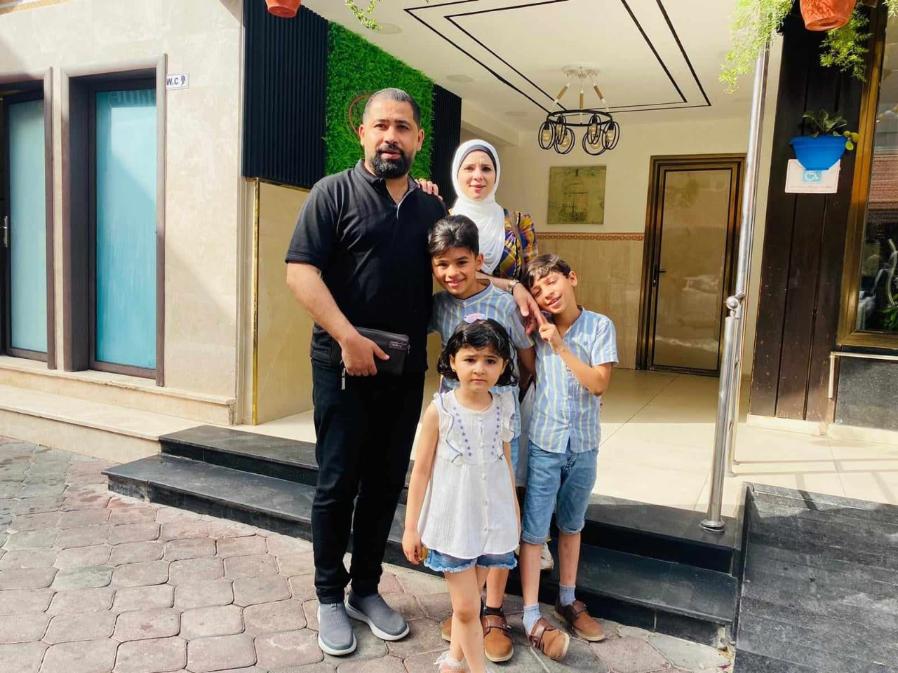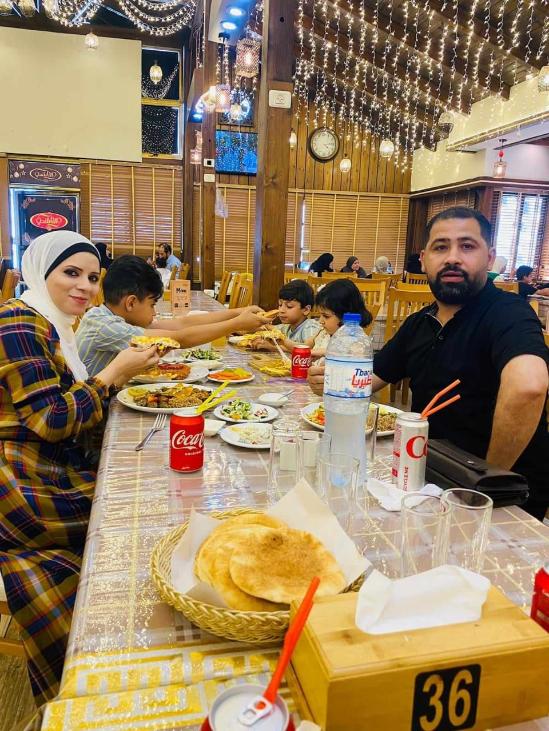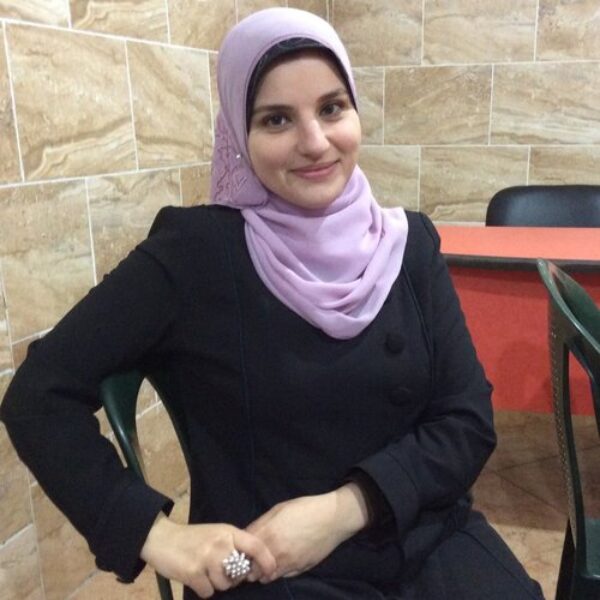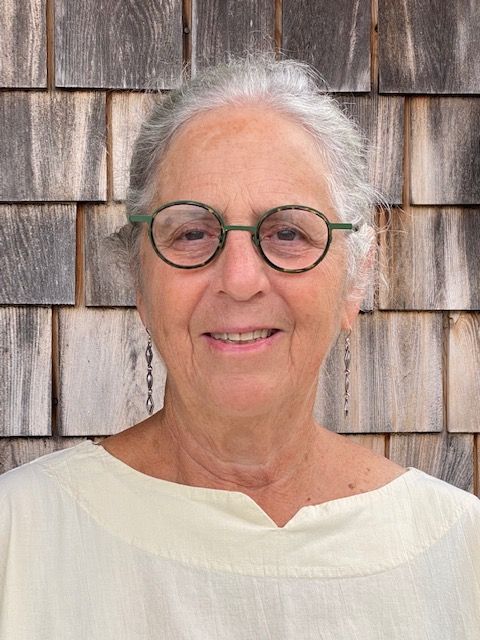Fatma Al Okor is the wife of Saeed Al-Taweel, a Palestinian journalist who lived in Rafah, in southern Gaza. On Oct. 10, while covering Israeli crimes in Gaza, he was killed, targeted by an Israeli rocket. While filming events in Gaza, he and his news team were ordered by the Israelis to leave their office before it was bombed. They left but continued filming from a different location; then, that, too, was struck, ending Saeed’s life.
Saeed had four children: Radwan, age 12 years; Abed Alrahman, age 11; Noran, age 6; and the youngest, Lojayen, age 9 months.

He refused to stay at home and just watch the news like others. On Sunday morning, Oct. 6, he put important papers and clothing for everyone in a bag beside the door and left for Gaza City to join other journalists covering the news there.
“What is coming will be worse than expected,” he told Fatma as he went out the door.
When he called later on his mobile phone, he asked her to take the bag, along with the children, and go to her family’s house when the bombings escalated. He gave instructions for the time they remained in the house. “The water will come at 2 o’clock,” he said to Fatma. “Don’t let Abed Al Rahman and Radwan sleep in one room. That way, if one dies, the other one may stay alive.” Saeed spoke to his son Radwan, saying, “You are the oldest and the one I always depend on. Take care of your mother and your siblings, and help your mother whenever she needs your help.” Finally, he said to his wife, “Don’t worry, I promise I will come tomorrow morning.”
That conversation was the last one between Saeed and his family. They went to bed waiting to see their husband and father the next day. Hours later, while they were still sleeping, the telephone rang. “The Israelis killed Saeed!” their friend cried. Fatma sat alone with the terrible news, waiting until her children woke up to tell them.
As a father, Saeed was “full of mercy and kindness for his children. He took them everywhere he went, particularly Radwan and Abed Alrahman,” Fatma told me. “Recently, I left him completely responsible for all four children.” Then she paused, and added quietly. “I wish to follow in his footsteps and raise our children as he would have liked.”
Friday was family day for Saeed and his beloveds. They would gather in the morning to plan their day. It began with all cleaning the house together. “He concentrated on every small detail, organizing things and seeing to our children’s personal cleanliness and appearance,” Fatma said. “They would make suggestions for our lunch, then he would take them to the market to buy the ingredients. While they went to the mosque, I would prepare the food so it was ready when they came home.”
“The day we miss Saeed the most is Friday.”
Killing dreams
Saeed was planning a surprise for his children on the day he was killed. Every morning he would ask them their predictions for that day. “So on Oct. 10, he asked, ‘What do you think we will do this day? Anything you want!’”
“Go on a trip!” “Go to a restaurant!” “Go to the sea!” “Have dinner outside!” the children offered excitedly. But whatever the surprise was that Saeed had planned, his children will never know.
The family had also planned to go to Egypt on the first of November for two months because Saeed’s sister was getting married. Saeed saved money and obtained the necessary passports. Fatma sighed, “They were about to be the most beautiful and amazing months in all our lives. We had wonderful dreams. But the Israeli assault on Gaza killed Saeed, demolished Gaza, and destroyed all our dreams.”
Fatma says that Saeed was extremely ambitious. He earned a bachelor’s degree from Al-Aqsa University and a master’s in public relations from the Islamic University of Gaza. “He was eager to finish his education and all his requirements in the shortest possible time,” she explained. He applied to a Ph.D. program in Sudan while finishing his master’s degree. Had the family gone to Egypt for the wedding as planned, Saeed would have continued to Sudan to discuss his doctoral program with officials at the university there.
Saeed was not only a journalist — he was also a social activist, specializing in media. “All his life he was a courageous fighter. He defended his homeland by speaking words of truth,” Fatma said. He started Akhbar Ala Alreeg (Early Morning News), a publication that summarized recent news in an everyday, colloquial style rather than classic Arabic, to make it more accessible to everyday people. It was extremely popular and is deeply missed by many. He also helped people with charitable giving initiatives such as Hagak Alena (We Apologize) and Samh Tojar (Forgive and You Will Be Gifted from Allah).
Unending catastrophe
For Fatma and the children, the disasters did not end with Saeed’s death. A few days later, Israeli soldiers destroyed her brothers’ houses and killed the wife and three children of one of her brothers. They were Layan, age 3, Jad Alhag, age 5, and Shady, age 8. They pulled the body of the mother and one leg of one of the children out from under the rubble. They couldn’t find the others.

Saeed’s family cannot stop the flood of memories or the flow of tears. “Do you remember when Baba brought my PlayStation when I had the highest score at school? And when he brought the bike to Abed Al Rahman?” Radwan recently asked his mother. One cold and wet day, Noran woke up crying and asking Allah to stop the rain. “I’m afraid Baba will feel cold and drown in rain water,” Noran fretted.
“My father is in heaven now and waiting for us,” Radwan said. “I hope we die soon and go to him.”
Fatma tells me, “When anyone asks Abed Al Rahman, ‘Who do you love more: Dad or Mum?’ he always answers directly, ‘Baba! I miss my father, I miss his voice. I wish I could speak with him.’”
I asked Fatma what she would say if she could speak to the whole world. Her reply was both a tribute and a lament:
Saeed! who never left the house without my prayers for him to fear God and serve people!
Who would greet me with a heart full of longing!
Whose youngest would always clap her hands and call his name when he came home.
Saeed! Beloved, cooperative, eased my troubles. Always thankful, content, praying, and blessed. He provided a decent life, a spacious, comfortable home for us.
She went on,
Saeed never failed to honor and understand me. He surprised me, made my soul happy, and comforted my mind.
He referred to me as “lover,” “partner,” or” friend” with friends and relatives. He rarely called me by my name.
Saeed! I loved everything about him. He was the angelic man in whom I saw the beauty of the whole world. He was elegant and kind, beautiful on the inside as well as on the outside.”
With Saeed gone, there is no income for Fatma and her children and they have no idea about their future. Though she goes on with faith and determination, she is filled with grief. She cries out, “Come, O world, to support Al-Aqsa and Jerusalem! Saeed died doing that! My children are young, and I am too young to be a widow!”
Throughout Gaza, her cries are echoed.










